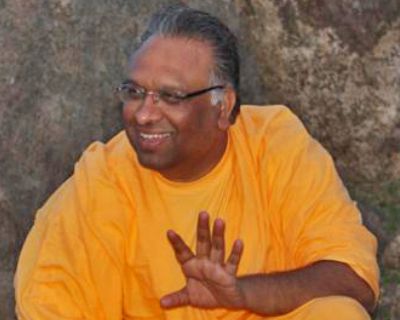Let us go deeper into this. Just for us to be aware that religion can be a trap as much as a release.
Observe closely how a man of implicit faith moves. The pious and the devout begin from an inherent and implicit trust that God exists, and that he runs this vast creation, according to what he deems right, and he enforces his code on every form of life here. In that sense, none of us owns anything here, none of us can truly possess anything here, none of us can fight for anything here. Either we have a choice to accept the verdict of God, or at worst, complain. But there is no escaping what God proposes. So, the maturing in piety is when you don’t complain, you don’t fret and fume, you don’t grieve, you find a graceful acceptance to how things are, and how they move.
The pious and devout are likely to take to some form of practice or ritual, to acknowledge the presence of God, to talk to him and vent their frustrations, to ask for relief, to divine his mind, etc. While they do realise that God is everywhere, and that’s how he can rule this world, they also feel that God can come to reside in special places, where he has manifested for the sake of devotees. Like Vithala manifested for Pundalika at Pandharpur. Thus, these shrines become popular places of visit and worship. For, not only do they prove that God does manifest if the devotion be true, but they also celebrate such devotion, essentially.
So, as I said, the devout trust that God exists, and constantly seek to align their entire existence according to the way God runs this world.
Of course, men of faith are put to the test regularly. They are likely to lose faith in the face of an insurmountable crisis, or due to some upheaval that destiny initiates. Most amongst the devout and pious merely seek a peaceful and settled life—definitely not lax in rhythm, and even quite vibrant in some cases—and, a constant connection with God. While many fall for superstitions and shallow sentiments, some do muster the grit and sturdiness to cross adversity and find their faith burnished in the fire of hardship. The faith in their hearts shines far better, and they open up to embrace God even more, willing to give up doubt and hesitation fully. Of course, such ones are rare.
Fundamentalism is the other breed that every religion tends to create. Overt violence is not the only way to identify a fundamentalist. Look around you. Someone calls himself a Hindu or Muslim or Christian, but he doesn’t visit a place of worship or say his prayers. Intrinsically, he doesn’t seem to need any God above him. Hence, he won’t easily bow his head down to anything or anybody. He draws his confidence and power from his identity, his caste, his birth as Hindu or Muslim. He makes no effort to listen to the great masters and seers of his religion.
Many fundamentalists may be free of vice and would guard themselves against indulgence and weakness. You will find them more committed to their identity rather than to truth; that doesn’t make them crooked either. They are capable of considerable compassion for the people around them, even for those belonging to other religions or castes or race. But, when it comes to their identity, they are unwilling to be defined otherwise, and they exude considerable pride in announcing their identity. One could ask, ‘As a Hindu, you haven’t read the scriptures, you haven’t followed the life laid out by the ancients—you aren’t even interested in the wisdom of their experience—you don’t believe in God either as an overseer or intervener, you don’t carry sentiments or feelings that discover some form of intimacy with God, you don’t seek wise men to change the very structure of your personality fundamentally, but you seek them only so that they accept you the way you are and bless you, how could you be called a Hindu?’
Do you get the point?
To illustrate with an example—both the pious person as well as the fundamentalist may show right proactivity in performing the final rites for their fathers, at the time of death. Every customary rite may be done as per prescription, by both. But, the attitude would be different. The pious man would think, ‘I don’t know whether there is another world beyond death, but if the scriptures and the elders say so, I will go by it, because I don’t think the scriptures and my elders ever meant to dupe me. And, they know better! If they believe that something exists, and that is where my father goes after death, I too shall believe the same. Why would I disbelieve it? I respect and love my father, and I will do everything to keep him comfortable wherever he is’.
Whereas, a fundamentalist could think this way: ‘When I define myself as a Hindu, it is incumbent upon me to perform all these rituals and adhere to customs properly. As a Hindu, I must perform all these without hesitation. If as Hindus, we give up all these customs and rituals, Hinduism is sure to turn decadent. We must keep alive all these traditions; hence, I shall do it. It doesn’t matter whether I believe in a life beyond death or not. If this is the custom, I will do everything to uphold it.’
Do you see the difference?
The pious man considers the structure of family, the 16 saṃskārās, and such other customs as a prescription given by God, scriptures, and elders, and he takes that as a command to simply go through them well. The overall picture, the why of it, shall unravel eventually—the pious man believes—as one goes through life, as one matures. Until it becomes naturally vivid, faith is the way forward. And, every prescription is to be understood rightly, both in spirit and practice, and done.
Fundamentalism, on the other hand, needs organised behaviour. Therefore, to remain within the flock of Hinduism or Islam or Christianity, the fundamentalist is willing to forego many things; he is willing to sacrifice many comforts and privileges, and in some extreme cases like terrorism, willing to even give his life for it.
While the devout and pious are actually independent in their faith, and they attempt to connect to God directly, the fundamentalist seeks others of his flock, who also draw strength from this identity. That is how cults get formed, rhetoric-laden speeches are made, and of course, much good work also happens. But, in and through all these, the primary pitch is assertion and confirmation of the religious identity.
Be it a monk, householder, businessman, or government official, be it man or woman, you could either develop a unique sense of God with time, and stay true to it, remaining pious and devout, and therefore contained, or you could be a fundamentalist, more interested in asserting your religious identity with enormous pride.
However, the truth is this: Neither the devout nor the fundamentalist have had right entrance into religion, its vast canvas, and what its true lamps shower light upon.
Seers like Śaṅkara and Vyāsā, men who defined the essence of Hinduism, discovered a third way to connect to religion. Śaṅkara did that at a very young age. Many of us would think that a young eight-year-old boy couldn’t have moved towards the higher because he hardly knew anything of this world in the first place, he knew nothing of humans, their social organisations, the issues of caste or race or language, etc. The boy would be too young to realise the gravity of all these issues. Add to this the struggle of the human in this world in terms of survival, in terms of ambition or aspiration, the power of money, position, and pleasure—such a young boy would hardly have realised how real these dimensions of life are. Isn’t this how we would think?
Śaṅkara himself answers such questions, though indirectly.
The fundamentalist intuits and owns up the sense of that glorious Hindu identity, without anyone educating him about it, without him undergoing any sort of training. To own up, one doesn’t need any training or cultivation of thought. Once you own up, you go through all of that, to strengthen your conviction.
The pious and devout person experiences strong faith that there exists a God who created all of us, and who wouldn’t be so irresponsible as to leave us all to figure out the rest of the script by ourselves. He would intervene appropriately to help us all lead our lives in consonance with his order.
So too, Śaṅkara would suggest that one could stumble upon the sacred right at a young age and respond to its call. To stumble upon the sacred directly, one doesn’t need to go through every experience of life here, and then mature out; one can come to it directly, Śaṅkara points out. And, of course, those of us who don’t stumble upon it directly need to go through the path of piety, eschew fundamentalism, because fundamentalism in its very nature promotes relativity, and such relativity doesn’t lead one towards the Absolute, God. Śaṅkara advises piety as the first step if you haven’t come upon the sacred directly.
Please understand what I mean clearly. I am not referring to sanctity either as an idea or experience. Nor am I saying God is sacred, some concept of Advaita is sacred, or some process of religion is sacred. No such inferred sanctity. I am referring to sanctity per se, as it is, directly. Śaṅkara, the Buddha, Ramana heeded the call of sanctity directly, and hence, avoided the pitfall and trap of fundamentalism, renounced the slavery to their genes, even bypassed the long-drawn process of faith and piety, and hit the nub of life, God, and the truth of this universe. This is how Śaṅkara could talk about the truths of life, even though he had hardly experienced the breadth of life, as we know it, first hand.
Hinduism believes that if one leads a full life of say 100-120 years, actively, in good health, not escaping or dodging anything, then by the end of life, one is likely to have unravelled the entire canvas of life, with a good first-hand sense of all its dimensions. Which also means understanding the puzzle of death, the puzzle of the origin of everything, the riddle of this enormous multiplicity, the extraordinary extent to which life can undergo upheaval and even appear to lose its roots, the value of everything, everything in its place, so on and so forth. Even so, one may still not stumble upon the sacred. One may have uncovered everything of life, but one may still not have touched the very substratum. Touching the very substratum, and finding the wherewithal to stay as the substratum, can result only when there is a call from the sacred.
Touch the sacred, live as the sacred, turn around to see the universe and life here. What you see would have changed drastically. That indeed is the call of religion.
Shouldn’t we care to heed?








